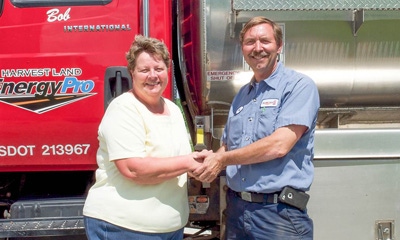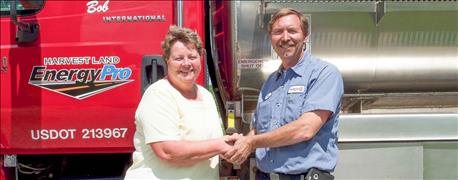
Maybe your focus is on surviving day to day and getting your work done, and you don’t spend much time thinking about the future. Even if you do, maybe you don’t think about whether or not the curriculum offered at ag schools is keeping pace with the times. But unless someone does, ag curriculum could stay status quo. If ag training stays status quo and doesn’t change, perhaps agriculture stays the same as well.
CountryMark gave readers an incentive to stop and think not only about the future, but also about what ag schools should be teaching. Top essays in this year’s adult essay contest receive free diesel fuel.

FUTURE CURRICULUM: Jackie Angle believes ag schools must keep pace with the times. She received 500 gallons of CountryMark Premium Dieselex-4 fuel from Bob Taylor, Harvest Land Co-op petroleum sales rep, for her winning entry in the 2016 CountryMark/Indiana Prairie Farmer adult essay contest.
Jackie Angle, Rush County, took the challenge seriously. It earned her first place and 500 gallons of fuel. Indiana Prairie Farmer co-sponsors this contest each year. There is also a youth division, with a different topic. The adult essay topic was: "What new courses should ag schools consider adding in the next five to 10 years?"
Here is Angle's winning response:
“I like going to flea markets and looking for books for my two granddaughters. If I am lucky, I can find books about farming. Many of them show farming the way it was 50 years ago. The books show a big, white house with a red barn. The chickens are pecking in the yard, the cows are grazing in a pasture and the hogs are in a hog lot. Children are playing with kittens. Mother is hanging clothes on a line. Father is plowing a field with a small tractor and a two-bottom plow. Things have changed!
“Just as things progress in agriculture, current curriculum must not only keep up, it must keep ahead. I looked at Purdue University’s College of Agriculture’s list of classes offered. Starting with Agribusiness Management to Sales and Marketing to Food Science to Animal Science to Crop Science to Horticulture to Forestry, and everything in between — you get the picture.
“Agriculture involves so much more than feeding the hogs, gathering the eggs and milking the cows. Students today who major in agriculture literally have limitless possibilities.
“When looking at the next five to 10 years in agriculture, I see more and more technology becoming a player. From GPS systems to computerized equipment to use of drones, classes need to show the advantages, the how and the why in using these ‘tools.’ These types of technology hopefully would excite the student to think beyond and develop future uses.
“Why not develop a combine that has some sort of ‘microwave’ capability that when the grain is harvested, as it goes through the equipment, it’s dried to the preferred moisture? It then can be taken directly to storage, saving drying costs, equipment costs and labor costs.
“Seeing how far agriculture has come makes me excited for the future!"
About the Author(s)
You May Also Like




